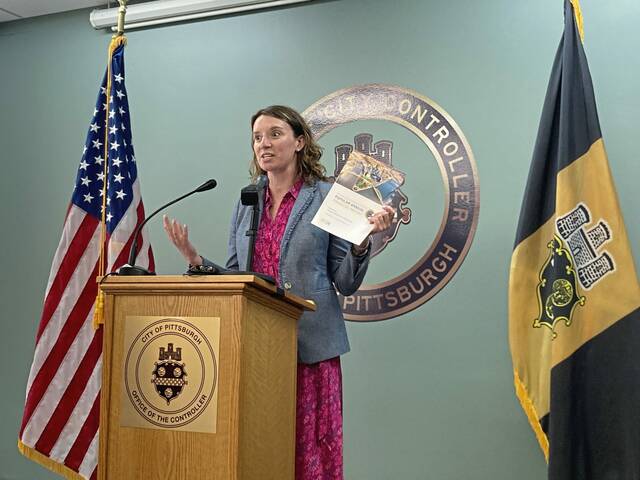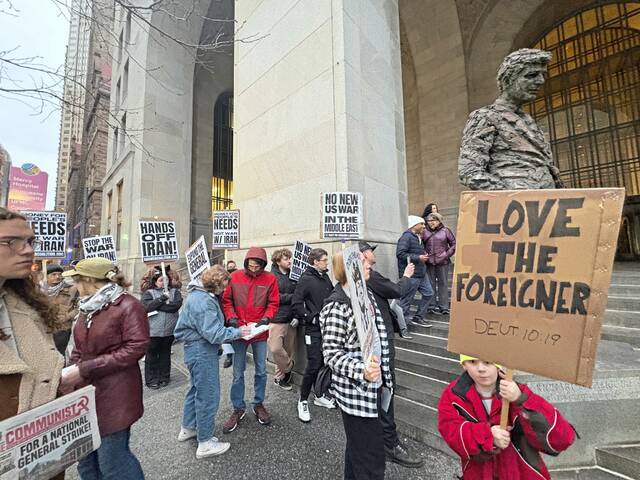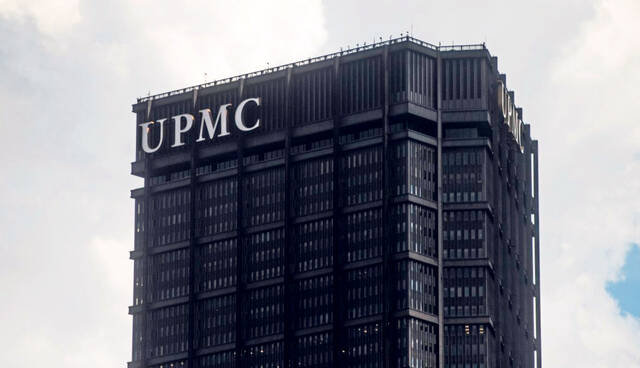Pittsburgh Controller Rachael Heisler on Wednesday warned that the city’s finances are “precarious” and urged officials to cut spending while growing the local economy.
In the first half of the year, the city spent $24 million more than during the same period in 2024, Heisler said.
That happened even though officials approved a slimmed-down budget.
“That is a significant increase and unsustainable,” Heisler said during a press conference at which she released a report on Pittsburgh finances last year and data for the first half of 2025.
“This year’s report tells a simple but serious story: Costs are rising faster than revenues, we are spending money faster than we are bringing it in, and this trend is not sustainable,” according to Heisler’s report. “This is not a crisis, but it is a call to action.”
Jake Pawlak, director of the Office of Management and Budget, said from January to June, the city spent 54% of its projected budget for the year.
During that time, the city collected 59% of its projected revenue, in part because the city collects more taxes in the first half of the year than in the second.
Heisler reiterated concerns about overtime for public safety and public works personnel.
Through the first half of the year, she said, the city spent 77% of its budget for overtime.
The city spent $3 million more on overtime for those two departments so far this year than it did over the same time period last year, according to the controller’s office. The city budgeted less money for overtime this year than last year.
Severe storms that struck the region in April resulted in more overtime for public works crews tasked with clearing trees and debris from roadways, Heisler said, as well as for some public safety bureaus.
If the city continues to spend overtime at the same pace it has so far this year, premium pay would exceed its budget by nearly $20.3 million, Heisler projected.
If the city reined in spending and stuck to its budget for the rest of the year, she said, overtime would still go over budget by more than $10 million.
“This is a deeper issue tied to staffing shortages and operational strain,” Heisler said.
The extra expenses, she said, will likely force the city to draw more from its reserve fund.
“Our ‘rainy-day’ reserve fund is healthy now, but it won’t carry us forever,” Heisler’s report warned.
Reserve fund to dwindle
Pawlak said he anticipates the city will be able to absorb the extra overtime costs by reducing spending elsewhere.
“We’re feeling confident about overall spending and keeping overall expenditures for the year within the ballpark of projections and ending the year with a surplus,” Pawlak told TribLive.
He acknowledged the city has faced challenges in implementing changes — like combination units for EMS and new overtime structures for public works crews — that officials had hoped would curb overtime spending.
“We clearly haven’t seen the fruits of those efforts yet,” Pawlak said, adding he still believed such efforts would eventually curtail overtime costs.
Pittsburgh already is set to draw from its reserve fund this year and in coming years. Officials have acknowledged the near future would prove fiscally difficult because of declining revenues and an end to federal covid-19 relief money.
The city’s reserves are expected to drop by about 70% over the next five years, the controller said.
“I’d say we’re in a precarious financial situation,” Heisler said.
Officials, she said, should be “budgeting appropriately.”
Allegheny County Controller Corey O’Connor, who defeated Pittsburgh Mayor Ed Gainey in the Democratic mayoral primary race, in a statement echoed Heisler’s concerns about overtime spending and shrinking revenue streams.
“We have continued to see declining revenues and growing expenditures across multiple cost centers,” O’Connor said. “The failure to properly manage the City’s finances jeopardizes its capacity to carry-out core services. This is unsustainable, and a course correction is needed to ensure that the City can renovate parks, pave roads, plow snow, support community and economic development and respond to emergency calls.”
O’Connor said the city must be “laser-focused on growth and collaboration to bring prosperity, opportunity and empowerment to every neighborhood in Pittsburgh.”
Seeking growth
Heisler said the city may need to consider pausing some programming to cut spending. She declined to provide specifics on what may be eliminated or scaled back, as the controller’s office does not budget the city’s spending.
But she urged officials to focus on core city services, the aging vehicle fleet and public safety personnel.
“We need to make sure the city is handling its basic functions,” Heisler said.
Pawlak said the city is preparing a “more comprehensive fleet investment plan” to address concerns that the city’s vehicle fleet is too old and prone to breakdowns.
Pittsburgh also needs to focus on growing and diversifying its economy and convincing nonprofits to provide payments in lieu of taxes to help bolster the budget, the controller said.
The federal government’s recent cuts to research at higher education institutions and Medicaid could impact a city whose economy relies heavily on education and medicine.
Pawlak agreed with Heisler’s assessment that costs are rising more rapidly than revenues.
Both said that is due, at least in part, to macroeconomic challenges impacting inflation, interest rates and other factors beyond the city’s control.
Pawlak said local leaders need to focus on areas where they can improve conditions, even as broader economic issues are beyond their scope. Improving wages and creating more jobs, he said, should be a top priority.
The city last year saw earned income tax revenue outpace real estate tax revenue for the first time, something Pawlak said is a “good sign” that signals job growth and improving job quality.
Some ‘bright spots’
Though much of Heisler’s analysis was grim, she also highlighted “bright spots” in the city’s financial picture so far this year.
Real estate tax revenue — which has been declining as Downtown office buildings are reassessed at lower values in the aftermath of the covid-19 pandemic — is $1.3 million higher than it was at this time last year, Heisler said.
That’s largely because properties in the city’s East End are being reassessed at higher values, according to the controller.
If that trend continues, Heisler predicts, real estate revenue this year could generate $3 million to $4 million more than anticipated.
The first six months of this year also showed positive signs for earned income tax revenue, which generated $1.5 million more than during the same period last year.
Pawlak said that’s a promising sign that wages are going up for Pittsburgh workers.
The city, he said, should work to bolster job growth to increase its tax revenue while decreasing its reliance on real estate tax.
In other areas, revenues are dropping.
Amusement tax revenue is down $1.6 million from last year; deed transfer tax is down $4 million from 2024; and parking tax revenue is down $1.3 million from last year, according to the controller’s office.
Interest earnings are about half of what they were at this time last year, Heisler said. Officials expected that drop partly because the city is no longer collecting as much interest on its smaller part of covid-19 relief money, much of which has been spent.
According to the controller’s office, core revenue sources — not including American Rescue Plan Act money — dropped by about $4.2 million so far this year, as compared to the same time frame last year.








